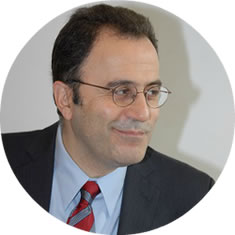Dallal occupied several positions throughout his academic career.
Ahmad Dallal was born in Beirut, Lebanon in 1957. He obtained his Bachelor degree in Mechanical Engineering from the American University of Beirut, Lebanon in 1980. Between 1980 and 1984, he worked as a Development Engineer at Middle East Airlines, Lebanon. In Fall 1984 he continued his studies at Columbia University, USA where he received his MA and PhD in Islamic Studies in 1986 and 1990 respectively.
Dallal occupied several positions throughout his academic career. His first appointment was at Smith College, USA, first as a Luce Visiting Scholar (1990-1991), and then as a Five-College Assistant Professor of Arabic Language and Culture (1991-1994). Between 1994 and 2000, he was an Assistant Professor (1994-1997) and Associate Professor (1997-2000) of Arabic and Islamic Studies at the Department of Near Eastern Languages and Cultures at Yale University, USA. Between 2000 and 2003, he was an Associate Professor at the Department of History at Stanford University, USA. And from 2003 to 2009 he served as the Chair of the Department of Arabic and Islamic Studies at Georgetown University. Between 2009 and 2015 he served as the Provost of the American University of Beirut, Lebanon. He is currently Professor of History at the American University of Beirut. Throughout his career, he served on the advisory and editorial boards of several professional organizations and journals, and has served as a member of the Board of Directors of the Middle East Studies Association of North America
Dallal published two books and an edited volume, as well as 42 articles and chapters in peer reviewed publications, and several book reviews and review essays. He organized and participated in more than twenty exhibitions, programs and documentaries related to his filed of study. He also made hundreds of conference and invited presentations on various subjects in his field. He has received numerous honors including fellowships and awards from the Society for the Humanities, Cornell University (1994-95); the American Philosophical Society (1995); the Whitney Humanities Center, Yale University (1996-97); the National Endowment for the Humanities (2003-2004); in 2007-08 he was named a Carnegie Scholar by the Carnegie Corporation of New York. In 2008, he was invited to deliver the Dwight H. Terry Lectureship in Religion, Science and Philosophy at Yale University. And in 2012 he received the Kuwait Prize in Arabic and Islamic Scientific Heritage from the Kuwait Foundation for the Advancement of Science.
Dallal’s academic training and research focus on the intellectual, historical and institutional contexts of the disciplines of learning in medieval and early modern Islamic societies, covering both the exact and the traditional sciences. His first book, An Islamic Response to Greek Astronomy; Kitab Ta‘dil Hay’at al-Aflak of Sadr al-Shari‘a (E.J. Brill, 1995), examines the astronomical work of the fourteenth century scientist and religious scholar Sadr al-Shari‘a al-Bukhari, who produced several renowned works on traditional religious sciences, and wrote an Islamic critique and reconstruction of Ptolemaic astronomy. In his second Book, Islam, Science and the Challenge of History, Professor Dallal examines the significance of scientific Knowledge and situates the culture of science in relation to other cultural forces in Muslim societies. - See more at: http://www.statushour.com/ahmad-dallal.html#sthash.pXJpPaoI.dpuf










